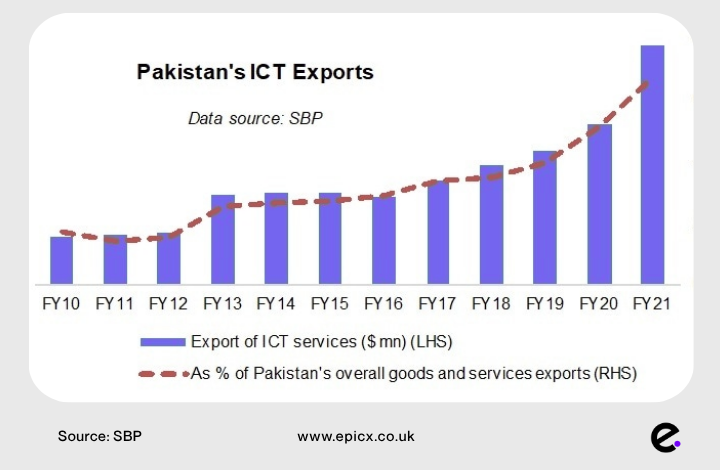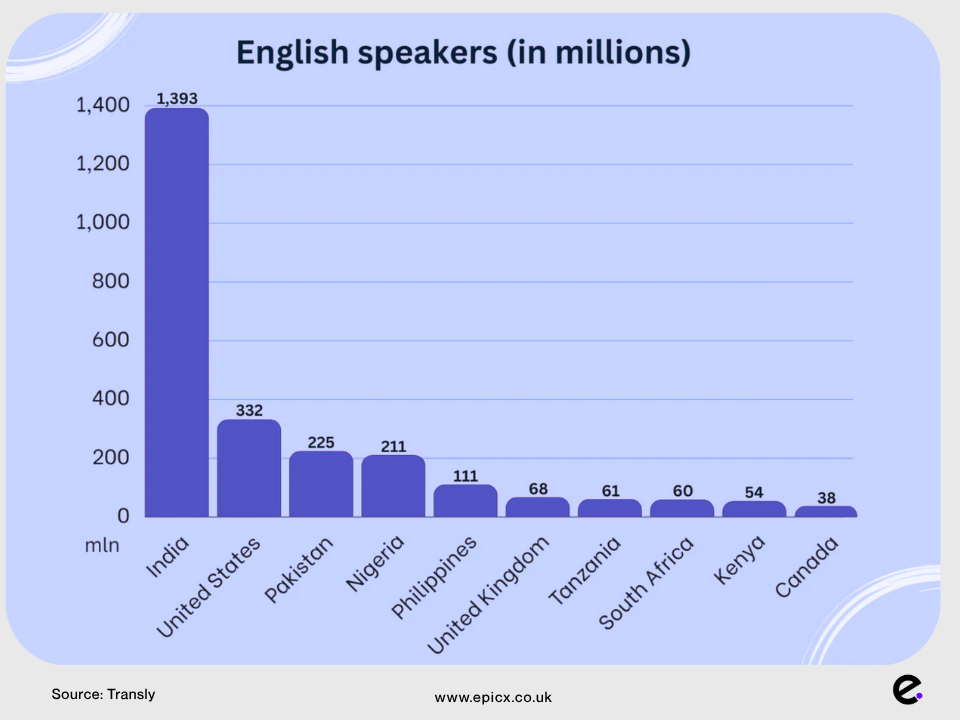Pakistan’s tech rise is real. See how founders scale with reliable teams, smart costs, and vetted remote developers delivered by epicX’s high-performance talent engine.
In 2025, startup founders and CTOs across the UK, US, and Europe face relentless pressure.
Budgets are tight. Product deadlines are tighter. And the tech talent shortage is more brutal than ever.
With tech talent demand at an all-time high, top developers in places like London or New York now command over $150,000 annually.
Hiring timelines are growing longer. And many companies are forced to ship late or scale back.
That’s where Pakistan enters the picture. A country of over 240 million, with one of the largest English-speaking populations in the world and a booming tech culture.
What was once dismissed as a low-cost outsourcing option is now leading in software development, remote work capabilities, and digital innovation.
Pakistan’s skilled developers, modern infrastructure, and thriving startup ecosystem make it an obvious yet overlooked answer to the tech talent gap.
This guide explores exactly why.
Packed with numbers, trends, and proof points, it breaks down how Pakistan is rewriting the rules of IT outsourcing, staff augmentation, and hiring remote developers.
For founders who care about quality code, cost-effective solutions, and real global reach, Pakistan is the bet to make.
Want to scale with staff augmentation that delivers Silicon Valley output at one-third the cost?
Start reading.
Busting Common Myths About Hiring from Pakistan
Before getting straight to the reasons why Pakistan is a smart choice for sourcing tech talent, it’s important to zoom out and understand what’s been holding many founders back.
The moment someone hears “hire developers from Pakistan,” a few stereotypes tend to surface.
Cheap labor. Unreliable infrastructure. Communication issues. Risky environments. These assumptions aren’t just outdated and largely misleading.
Most of these impressions are shaped by hearsay or narrow experiences, rather than the evolved, data-backed reality of what outsourcing to Pakistan actually looks like in 2025.
Founders scaling fast often avoid exploring new markets because they’re reacting to perceived risk.
In reality, avoiding Pakistan could mean missing out on an unmatched combination of skill, value, and innovation.
Let’s break down the five most common myths that still cloud the global perception of Pakistan tech talent and why they no longer hold up.
Myth 1: “It’s Just Cheap Labor”
One of the most stubborn misconceptions about hiring from Pakistan is the assumption that affordability equals low quality.
When startup founders hear the words "cost-effective software development," many automatically assume they’re compromising on capability or creativity.
The belief is that a lower price means cutting corners or settling for juniors.
This myth is further fueled by comparisons with past offshore outsourcing experiences, where devs might have underdelivered due to weak oversight or mismatched expectations.
This is what epicX's Founder & CEO, Hassan Azhar Khan, had to say about the cost-efficiency of Pakistan tech talent on his LinkedIn post:

But Pakistan’s affordability isn’t a symptom of inexperience. It’s a reflection of favorable macroeconomic factors like currency exchange rates and a large, young workforce, not a lack of quality.
In 2025, Pakistan will produce more than 50,000 IT graduates every year.
Many of them are trained in globally in-demand programming languages like Python, JavaScript, and Go, with deep proficiency in frameworks such as React, Node, and Laravel.
Universities in cities like Lahore and Islamabad have built partnerships with international tech firms to ensure up-to-date curricula that match global standards.
Pakistani software engineers have worked on products for Fortune 500 companies and startups that scaled to unicorn status.
Their GitHub and Stack Overflow profiles often outperform peers from more expensive markets.
In fact, according to HackerRank, developers from Pakistan consistently score high on logic, algorithm, and programming skills assessments.
The value in remote developers from Pakistan isn’t just affordability, it’s ROI.
These developers bring a mix of experience, agility, and reliability, often outperforming pricier alternatives in both delivery speed and quality code output.
Myth 2: “The Infrastructure Isn’t Reliable”
A common hesitation around outsourcing to Pakistan is the belief that tech infrastructure is unstable or outdated.
Founders scaling high-growth startups worry about internet drops during standups, lack of backup systems, and subpar work environments that might delay delivery.
The fear is not just about slow speeds, it’s about whether the environment can support serious, consistent product development.
That concern may have held water a decade ago. But in 2025, the technology infrastructure in Pakistan is in a different league.
Major cities like Lahore, Karachi, and Islamabad now host over 200 fully equipped coworking spaces, enterprise-level offices, and dedicated IT parks.
These spaces are designed to support startups, remote teams, and global delivery operations.
Internet connectivity has vastly improved as well.
The national average speed in urban areas now exceeds 25 Mbps, with fiber connections and redundant power backup becoming standard in top-tier tech hubs.
Several IT parks even offer enterprise-grade SLAs to outsourcing firms, ensuring reliability for long-term remote work.
The government’s Digital Pakistan initiative has accelerated this momentum.
Backed by public-private partnerships, the country has invested in smart city projects, 5G trials, and rural broadband expansion.
These policies aim to improve not just access, but quality and speed, positioning Pakistan competitively in the global tech market.
According to the World Bank and UNDP digital reports, Pakistan’s IT infrastructure has matured faster than many regional peers.
Its mobile broadband penetration is now over 50 percent, and the country has seen a steady rise in remote work capabilities, even for high-compliance industries.

Myth 3: “There’s a Language and Culture Barrier”
The phrase “remote developers from Pakistan” still raises concerns for some founders who assume there will be constant miscommunication, cultural dissonance, or slow iteration cycles.
They picture awkward Zoom pauses, lost context in Slack threads, or documentation full of ambiguous explanations. For companies in the UK, US, or Europe, these concerns feel valid, especially when working on products where clarity and agility matter most.
But the reality on the ground paints a different picture. Pakistan ranks as the third-largest English-speaking country by population.
English is not just an academic subject but the primary language of instruction across universities, including top engineering programs. It is also the official language for business, law, and government.
This fluency is one of the reasons Pakistan has become a preferred destination for clients looking to hire remote developers who can plug into global workflows without friction.
On the cultural front, Pakistan’s tech workforce has grown up on Silicon Valley playbooks. Agile sprints, async updates, Git workflows, and tools like Jira, Notion, and Trello are already part of their daily stack.
Many mid-career developers have worked with startups in Berlin, London, or Austin and understand the importance of crisp documentation, respectful critique in code reviews, and daily check-ins that don’t drag.
In fact, cultural alignment has become one of the biggest advantages when sourcing tech talent from Pakistan.
According to a recent report by the Pakistan Software Export Board, over 75 percent of outsourced software projects now follow international product development protocols, with English as the default communication channel.
Read More: What is Staff Augmentation? Guide to IT Talent Sourcing
Myth 4: “Security and IP Risks Are Too High”
Security concerns often stop founders in their tracks when they think about outsourcing to Pakistan.
The fear is that working with offshore developers might expose source code, intellectual property, or product roadmaps to misuse or leakage.
This belief is amplified by outdated news headlines or assumptions that South Asian countries lack strong legal and cyber frameworks. It’s understandable.
For tech startups handling user data or proprietary algorithms, trust matters more than cost. The truth is, Pakistan has made major strides in digital security, IP law, and data protection.
The Prevention of Electronic Crimes Act (PECA) governs cybercrimes and IP violations and has been actively enforced since 2016.
Additionally, the country has established dedicated cybercrime units under the Federal Investigation Agency, trained specifically to handle corporate IT and IP matters.
Many tech hubs in Pakistan also require companies to follow strict NDAs, data encryption standards, and secure hosting practices.
A 2023 global outsourcing readiness index by Accelerance placed Pakistan ahead of many Eastern European countries in terms of legal readiness, workforce compliance, and IP protection mechanisms.
Major international clients, including Fortune 500 brands, trust Pakistani firms with highly sensitive data under robust service-level agreements and internationally compliant contracts.
Myth 5: “It’s Only for Freelancers”
For many founders, hiring from Pakistan brings up an image of loosely managed freelancers juggling multiple clients.
This perception often comes from experiences on freelance platforms where reliability, commitment, and long-term alignment can be hit or miss.
Founders seeking dedicated teams worry they might only find short-term contractors without a sense of ownership or product thinking.
This myth blocks them from tapping into Pakistan’s full potential as a destination for structured, long-term IT outsourcing. The reality is that Pakistan's tech industry has rapidly professionalized.
In 2024, the country exported over $3.5 billion in IT services, much of it through structured, enterprise-grade delivery models.
Companies like epicX, 10Pearls, Systems Limited, and Contour Software operate in product cycles that mirror global standards.
Most major cities now have high-end tech parks, agile training centers, and thousands of developers working full-time in remote teams, staff augmentation partnerships, and dedicated delivery models.
Pakistan is no longer just a freelance economy. The workforce has matured into scalable offshore teams offering full SDLC capabilities, ranging from product discovery to DevOps.
Government-backed initiatives like PSEB and Ignite have further elevated the ecosystem by funding incubators and certifying export-compliant service providers.

9 Reasons Why Pakistan Is the Smartest Bet for Tech Talent in 2025
1. World-Class Talent at a Fraction of the Cost
In a world where every hiring decision directly affects runway, Pakistan presents one of the most cost-effective options for accessing elite engineering talent.
The disparity in currency value and living costs between Pakistan and Western markets makes a compelling case for affordable tech talent without sacrificing expertise.
The average monthly salary of a senior software engineer in Pakistan ranges between $2,500 to $3,500.
Factor in overheads, and top-tier devs still cost between $5,000 to $7,000 a month, nearly one-third of what the same hire would cost in San Francisco or London.
Here’s a snapshot of comparative annual salaries for senior engineers across markets:
| Region | Annual Cost (Senior Dev) |
|---|---|
| San Francisco, USA | $150,000 – $180,000 |
| London, UK | $120,000 – $140,000 |
| Berlin, Germany | $100,000 – $120,000 |
| Toronto, Canada | $90,000 – $110,000 |
| Lahore, Pakistan | $60,000 – $84,000 |
This 60 to 70 percent cost advantage stems not from poor quality, but from labor arbitrage.
Many of these engineers have worked with global firms across fintech, healthtech, and enterprise SaaS. The value lies in their blend of technical proficiency, strong programming skills, and budget friendliness.
Top talent in Pakistan is fluent in popular software frameworks, modern programming languages, and emerging technologies like AI and blockchain.
Several notable global ventures are led or co-founded by Pakistani technologists.
These include Sualeh Asif’s Cursor, an AI coding assistant now valued at nearly $10 billion. Other notable names include Affinity, KeepTruckin (now Motive), and PriceOye.
For startup CTOs, being able to hire software developers in Pakistan means achieving long-term scalability without burning through cash.
It is the blueprint for high-growth teams who want to build more with less.
2. A Deep and Growing Talent Pool
Pakistan’s tech ecosystem is fueled by one of the largest and youngest labor forces in the world.
With nearly 65 percent of the population under the age of 30, the country is producing a wave of digitally savvy professionals who are eager to compete on a global stage.
Each year, over 50,000 new IT graduates enter the workforce, equipped with degrees in computer science, engineering, and emerging technologies.
Many are trained in software development, AI, blockchain, and cloud infrastructure through local universities, bootcamps, and global certifications.
According to the Pakistan Software Export Board (PSEB), the country now has more than 500,000 active IT professionals, including software engineers, QA analysts, DevOps specialists, and UI/UX designers.
This vast and evolving tech talent pool gives global companies access to diverse skills without the recruitment bottlenecks common in saturated markets like the US or UK.
With demand surging globally due to the tech talent shortage, tapping into Pakistan’s developer base offers companies a long-term hedge.
Rather than fishing in a shrinking local pond, firms can source tech talent from a region where supply is expanding rapidly, and where the hunger to learn is deeply embedded in the culture.
For businesses building offshore software development teams, this depth translates to real scalability.
Whether launching an MVP or building enterprise systems, companies can rely on consistent access to skilled developers familiar with modern technology talent demands.
Read More: 25 Best Sites to Hire Mobile App Developers
3. High English Proficiency for Smooth Collaboration
English fluency is one of Pakistan’s strongest, most underrated assets when it comes to remote work capabilities.
As the third-largest English-speaking country in the world, Pakistan produces developers who not only write clean, quality code but also communicate effectively in English.
English is the medium of instruction across most universities, especially in engineering and IT programs, and is widely used in the corporate tech sector.
This linguistic advantage removes one of the biggest friction points in global collaboration: communication lag.

Developers in Pakistan actively participate in daily standups, code reviews, sprint planning, and stakeholder meetings with ease.
Their ability to articulate technical problems, propose innovative solutions, and document processes clearly leads to faster onboarding and fewer miscommunications.
Many have experience working with offshore teams based in the US, UK, Germany, and the Middle East. They’re well-acquainted with software frameworks, agile workflows, and asynchronous communication tools like Slack, Jira, Trello, and GitHub.
Moreover, the rise of staff augmentation companies like epicX makes them highly compatible with international team structures from day one.
For founders scaling globally, hiring English-speaking developers ensures a seamless fit with internal product teams and external stakeholders.
It also means reduced reliance on translators, fewer revision cycles, and smoother knowledge transfers.
In an industry where every delay costs money, clarity in communication becomes a competitive advantage.

4. Time Zone Advantage for Real-Time Sync
One of the most frustrating bottlenecks in global collaboration is time lag. Teams that operate on opposite schedules face delayed feedback loops, missed standups, and broken iteration cycles.
This is where Pakistan offers a strategic edge few founders fully appreciate.
With a standard time zone of GMT+5, Pakistan provides overlapping working hours with both European and North American time zones.
That means product managers in London, developers in Berlin, and founders in New York can all sync with Pakistani engineers during a shared window of their day.
This overlap becomes especially valuable during sprint reviews, production pushes, or critical bug fixes where real-time input is essential.
Here’s how the overlap typically looks:
| Region | Local Working Hours | Overlap with Pakistan (GMT+5) |
|---|---|---|
| UK (GMT+1) | 9 AM – 5 PM | 1 PM – 5 PM PKT |
| Germany (GMT+2) | 9 AM – 5 PM | 12 PM – 5 PM PKT |
| US East (GMT-4) | 9 AM – 5 PM | 6 PM – 10 PM PKT |
| US West (GMT-7) | 9 AM – 5 PM | 9 PM – 11 PM PKT |
| UAE (GMT+4) | 9 AM – 5 PM | 10 AM – 5 PM PKT |
| Australia (GMT+10) | 9 AM – 5 PM | 2 AM – 10 AM PKT |
For European teams, there’s a natural 3–5 hour daily window.
For US-based teams, flexible shifts or split schedules in Pakistan allow for real-time interaction even with East Coast operations.
This is far more efficient than working with teams in regions where there is zero overlap, which often leads to 24-hour delay cycles on basic tasks.
Remote development sync is only as strong as the hours in which people are actually awake together.
Pakistan’s strategic time zone makes it an ideal location for time zone-aligned remote teams that need real-time momentum, not just overnight output.
This advantage becomes even more critical for teams doing rapid prototyping, high-frequency deployments, or managing distributed product squads.
When your devs are available during key working hours, blockers are removed faster, tickets close sooner, and velocity increases, without burning out either side.
5. Strong Government Backing and Export Policy
Behind every thriving tech ecosystem is an enabling policy framework. Pakistan’s government has stepped up in recent years with a clear intent to turn its IT sector into a leading export engine.
This shift is not just visible in headlines; it is reshaping infrastructure, education, and foreign partnerships across the country.
The Digital Pakistan initiative has laid the groundwork for long-term tech growth.
From launching technology zones and e-governance programs to digitizing the tax system and education, the reforms have reached every level of government.
As a result, IT outsourcing has become one of the country’s fastest-growing export categories.
According to the State Bank of Pakistan, IT exports crossed $3.2 billion in 2023, with a government-backed goal to surpass $5 billion by 2025.
Export-friendly policies, including 100% profit repatriation, zero tax on IT services, and specialized technology export zones, have encouraged both local entrepreneurs and global firms to build and scale tech businesses from Pakistan.
Government partnerships with private incubators and accelerators have also expanded rapidly.
Through public-private ventures like Ignite, the Ministry of IT has helped fund R&D labs, skills bootcamps, and early-stage startup grants.
Pakistan Software Export Board (PSEB) now maintains strict quality benchmarks to onboard companies that serve international clients, which has helped raise global confidence in Pakistan tech outsourcing.
This level of structural support is rare among outsourcing destinations. For startups and enterprises looking for a partner in long-term digital innovation, these signals matter.
With reliable frameworks in place and government policy firmly aligned with global tech demand, Pakistan is no longer an emerging option; it is a proven hub for remote work capabilities and global delivery.
6. A Startup Culture That Matches Your Hustle
Pakistan’s tech scene has evolved far beyond service outsourcing. What’s taking shape now is a founder-driven, product-first startup ecosystem that mirrors the scrappiness and pace of early Silicon Valley.
For founders and product leaders, this is a critical cultural alignment that few emerging markets can offer.
Incubators and accelerators such as Plan9, NIC, Reap, and Tech Valley have helped foster hundreds of early-stage startups. International programs, including Google for Startups, Y Combinator, and 500 Global have already backed Pakistani ventures.
Over $300 million in startup funding was raised in Pakistan during 2021 alone, which is a significant leap that signaled international confidence in the country’s innovation potential.
Several notable Pakistani startups have gained international traction.
- Airlift, once a mass transit startup, pivoted into e-commerce logistics and raised over $100 million before its exit.
- Bykea, a ride-hailing and delivery platform, continues to scale despite regional competition.
- Bazaar Technologies, a B2B e-commerce startup, has attracted significant global investment due to its execution speed and operational depth.
This homegrown momentum builds a tech culture that is deeply aligned with Western startup values.
Pakistani engineers understand what it means to build fast, break things carefully, and launch under pressure. They are used to thinking like owners, not just coders.
For companies hiring globally, this mindset means less time spent explaining product urgency and more time co-building with people who already think in sprints, features, and customer outcomes.
The result is not just skilled developers, but true technology talent capable of owning roadmaps, not just tasks.

7. Cultural Compatibility That Eases Onboarding
For any remote team, technical skills are just one piece of the puzzle. What often breaks remote collaboration is not code, it’s context.
Misaligned work ethics, communication habits, or accountability expectations can slow down even the strongest engineers.
This is where Pakistan’s cultural compatibility becomes a major operational advantage. Pakistan shares deep-rooted historical, educational, and business ties with the West.
From language fluency to work culture, Pakistani professionals have grown up absorbing Western norms.
English is the official language of business and education, which not only ensures fluency but also sharpens business communication skills.
Most IT professionals are trained in environments where daily standups, weekly retros, and documented workflows are the norm.
More importantly, there's a strong emphasis on respect for deadlines, accountability, and ownership of work. This isn’t accidental. It stems from both educational structure and early exposure to global teams.
Developers in Pakistan are used to working in fast-paced environments where tasks are tracked in Jira, updates are pushed via GitHub, and collaboration happens over Slack and Zoom.
Attrition rates are also worth noting. While many global tech hubs suffer from frequent developer churn, Pakistan's developer loyalty tends to be higher.
This is partly due to less saturation in the local market and partly because many developers see long-term remote roles as career-defining opportunities.
When founders look to hire remote developers, they often underestimate how much cultural fit impacts velocity.
With Pakistan, you gain not just a skilled resource, but a collaborative teammate who understands the rhythm and rigor of global product development.
8. Proven Expertise in Emerging Tech
Pakistan’s developer community is no longer confined to basic frontend work or freelance web projects.
Today, its top talent is actively contributing to global AI-driven platforms, cloud-native infrastructures, and blockchain-based products that demand precision, scale, and deep domain expertise.
This shift marks a major evolution in the country’s tech landscape and signals that Pakistan is now positioned as a serious player in the emerging tech space.
The talent pool has undergone significant upskilling over the past five years.
Platforms like Coursera, Udemy, and EdX are widely used, but more importantly, Pakistan now has its own ecosystem of tech education platforms like Recurship, DataCamp PK, and Saylani Tech, which offer hands-on training in machine learning, DevOps, serverless architecture, and more.
Government initiatives such as the Presidential Initiative for Artificial Intelligence and Computing (PIAIC) have further accelerated this by producing thousands of engineers trained specifically in AI, cloud computing, and IoT.
Startups are leading the charge. Lahore-based VisionX is building computer vision and AI-powered retail analytics for Fortune 500 clients.
Bazaar Technologies, one of Pakistan’s fastest-growing B2B platforms, leverages cloud infrastructure for real-time inventory and supply chain intelligence.
Dastgyr, Airlift Technologies, and Bykea all rely on scalable microservices and real-time data systems, showcasing advanced engineering practices not often associated with emerging markets.
In AI specifically, Pakistan is home to dozens of research-driven ventures.
Xylexa, a healthtech startup, uses AI for early breast cancer detection and is already making waves in clinical diagnostics.
Meanwhile, PakLaunch and Colabs AI verticals are helping incubate and fund AI-first companies targeting global markets.
Pakistan is no longer an outsourcing destination for basic tasks. It’s where next-gen platforms are being built, tested, and scaled quietly but impressively.
The ecosystem may still be maturing, but when it comes to sourcing AI developers Pakistan or cloud engineering Pakistan, the country now checks all the right boxes.
9. High Reliability and Low Churn
One of the most overlooked advantages of hiring from Pakistan is talent retention.
In contrast to high-turnover markets like India or Eastern Europe, where developers often switch jobs for marginal pay bumps, Pakistan’s talent base offers stability and long-term commitment, especially when engaged through structured, full-time models like staff augmentation.
A key reason is market maturity. Pakistan’s outsourcing industry is still emerging compared to its global counterparts. This means top-tier developers are not constantly being poached by dozens of competing firms every month.
According to a recent report by Pakistan Software Export Board (PSEB), the average tenure of developers working in export-oriented tech companies is 2.8 years, significantly longer than in saturated markets where one-year churn is the norm.
To maintain reliability, many companies work with vetted partners who provide contractual continuity, performance oversight, and talent replacement guarantees.
For example, working with a staff augmentation partner like EpicX ensures access to engineers who are not only highly skilled, but also supported by a structured system that ensures retention.
EpicX offers 2-week trials, clear performance tracking, and the ability to replace underperformers quickly, removing typical hiring risks altogether.
For startups scaling fast, churn kills velocity. Onboarding new developers every few months drains time, energy, and capital.
Long-term remote teams Pakistan offer a solution—stable, scalable, and invested in your product’s success.
That’s not just a hiring advantage. It’s a growth enabler.
How epicX Sources the Top 1% of Tech Talent from Pakistan
epicX is not just another outsourcing vendor. We are a specialized staff augmentation partner built to help startups scale faster by giving them access to the top 1% of tech talent in Pakistan.
Every engineer in our network is deeply vetted, highly trained, and experienced in building real products for global companies.
What sets epicX apart is not just who we hire, but how we prepare them to deliver at startup speed.
Our approach blends technical rigor with real-world startup sensibility.
We don’t stop at academic credentials or work history. Instead, we put every candidate through a structured pipeline that mirrors the expectations of modern product teams.
This ensures the engineers we deliver are not only technically strong but also startup-ready, collaborative, and proactive.
Here’s What Our 4-Step Vetting Process Looks Like:
- Code challenges modeled after real-world startup problems
- Live technical interviews with product-first engineers
- Cultural fit assessments focused on async collaboration, ownership, and curiosity
- Stack-specific simulations that mirror your actual work environment
Once onboarded, every developer gets access to continuous learning resources.
Through internal labs, pair programming, and expert-led workshops, we help them stay ahead of AI advancements, new cloud architectures, and emerging tech frameworks.
This keeps your remote team not just current, but competitive.
We focus on long-term fit, fast delivery, and full visibility.
You get matched with exact-fit developers within 48 hours, and every engagement starts with a two-week free trial.
No risk. No long-term lock-ins.
Just top talent from Pakistan’s smartest engineering pool, ready to hit the ground running.

It’s Time to Rethink Your Hiring Map
If you’re scaling a startup and want the best ROI, it’s time to look beyond crowded, expensive markets.
Pakistan offers a rare combination of affordability, skill, reliability, and startup-ready culture.
With proven IP protection, government support, and a rapidly growing talent pool, your next best hire could be just a call away.
Launch a pilot with epicX and discover what the top 1% of Pakistani tech talent can do for your roadmap.
Frequently Asked Questions
How is the cultural compatibility with Pakistani teams
Pakistani engineers at epicX work in agile environments, follow Western workflows, and communicate fluently in English, ensuring cultural compatibility and smooth integration with global teams.
Are developers from Pakistan skilled in modern stacks?
epicX developers are fluent in key programming languages and software frameworks, regularly trained in emerging technologies like AI, serverless architecture, and cloud-native solutions.
How fast can I hire remote developers?
With epicX, you can hire remote developers within 48 hours, thanks to a pre-vetted skilled workforce ready for staff augmentation and immediate deployment.
Do Pakistan teams offer timezone alignment support?
Yes. epicX engineers work with real-time sync in mind, offering ideal time zone alignment for US and EU teams to accelerate product feedback loops.
Is staff augmentation better than freelancers?
Absolutely. epicX provides embedded teams through staff augmentation, offering reliability, long-term fit, and deeper alignment with your product and engineering culture.
Do epicX developers work with secure code?
Yes. epicX ensures compliance-ready development with strict IP protocols, secure repositories, and safe infrastructure when you hire remote developers from Pakistan.


